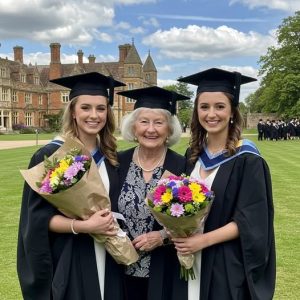The sun cast a golden hue over the old campus lawn, brushing across the red bricks of the ancient university building, but nothing outshone the smiles of two young women in matching graduation gowns, flanking a proud silver-haired lady.
To everyone passing by, it looked like the perfect picture of family joy: twin sisters graduating side by side, arm in arm with their beloved grandmother. But what this picture didn’t show — what no bouquet or cap and gown could capture — was the story that led them there. A story not just about perseverance, but about sacrifice, loss, and the kind of love that writes itself in scars instead of sonnets.
This is our story — and hers.
We were five when it happened. Too young to understand why our mother never came home from the hospital. Too young to know that postpartum depression doesn’t always come with signs. Too young to grasp that sometimes, love isn’t enough to keep someone alive.
Our father was shattered. He tried to be strong, but grief is a heavy thing to carry when you’re holding two little girls in your arms. Within a year, he began drinking — not the casual kind, but the kind that slowly steals the person you once knew and leaves behind someone distant, angry, and unpredictable.
It was Gran who stepped in. At 68 years old, she moved across the country, packed up her quiet life of gardening and Sunday crossword puzzles, and turned our chaotic home into a place of safety. She cooked, she cleaned, she walked us to school, and stayed up at night whispering lullabies she hadn’t sung since our mother was little.
But Gran didn’t just take care of us — she saved us.
School wasn’t easy. Kids talk. They ask questions. “Where’s your mom?” “Why is your dad always yelling?” We grew up learning how to lie with a smile. “She’s just working.” “He’s tired.”
But Gran taught us something else. That pain doesn’t have to define us. That we could take our broken pieces and build something beautiful. That education was our ticket out — and more importantly, our way forward.
“You don’t owe the world your pain,” she’d say, “but you owe yourself the chance to heal.”
So we studied. We studied through nights when the power was out. We studied through the eviction notice stuck to our door one winter. We studied through the whispered arguments between Gran and social workers, who kept asking whether a woman her age could raise two teenage girls on her own.
She never wavered.
When we received our acceptance letters to university — both of us, same school, same course — she wept. Not soft tears. The kind that come from somewhere deep, from years of holding everything in. We told her we’d defer. She said: “If you don’t go, everything I’ve fought for means nothing.”
She picked up part-time work at a bookstore, even with her bad knees. She rented out her house and moved into a smaller flat closer to the university so she could see us on weekends. She sent us grocery money from her pension. When we offered to get jobs, she said, “Study now. Work later. That’s the deal.”
And we kept our promise.
Four years flew by. Exams, heartbreaks, internships, shared dorms, and late-night phone calls with her. Every time one of us wanted to give up, the other would whisper: “Do it for Gran.”
And we did.
On graduation day, we wore our gowns not for ourselves, but for her. She was the reason we made it. As the photographer asked us to smile, Gran pulled something from her bag — two old, faded envelopes. Inside were the last letters our mother wrote before she passed. Letters she had entrusted to Gran for when we “were old enough to understand.”

We read them under an oak tree after the ceremony, in silence, tears staining the corners of the paper. Our mother had loved us. She had tried. And even in her absence, she had given us the greatest gift of all — the woman who stood beside us every step of the way.
Families aren’t always made by blood. Sometimes, they’re held together by the quiet strength of someone who chooses to stay when everyone else leaves. Gran never asked for recognition. She only asked that we make something of ourselves. And we did — for her, for our mother, and for the girl in us who thought she’d never make it.
And if you’re reading this, wondering whether the fight is worth it — trust me: it is. One day, you’ll wear your own gown. And someone you love will be right there, smiling, saying: “I always knew you could.”

